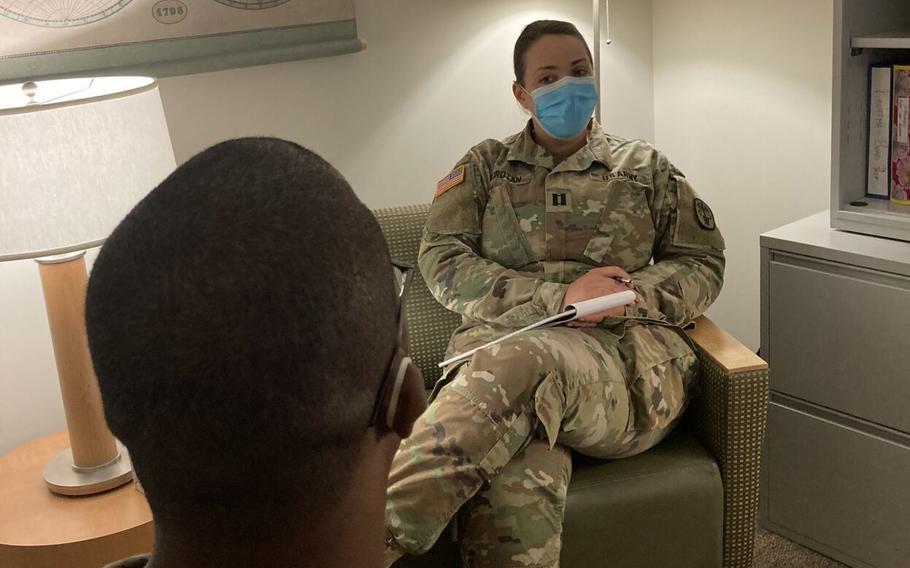
Captain Ioana Horotan, staff psychiatrist at Blanchfield Army Community, speaks with a soldier about substance use disorder in April 2021. (Fort Campbell Public Affairs Office)
Military members and their families have unique mental health needs. But a study shows that up to 35 percent of military recipients don't have access to adequate psychiatric care despite government insurance that covers such services.
Published in JAMA Network Open, the study looked at 39,487 U.S. Zip codes with at least one beneficiary of Tricare, the Defense Department health-care program that covers uniformed service members, retirees and their families. Researchers combined data from a variety of federal sources with community information.
The researchers knew there were fewer than 500 military treatment facilities that provide psychiatric care, so they broadened their search to include access to civilian psychiatrists, too. They found that 35 percent of Tricare beneficiaries lived in communities where the ratio between residents and psychiatrists — military or civilian — is more than 20,000 to 1. Another 6 percent lived more than a 30-minute drive from a military or civilian psychologist.
Access varied by region. Although 13 percent of the Tricare recipients lived in communities without shortages, 47 percent, mostly in the Northeast and on the Pacific coast, lived in places with civilian psychiatrist shortages that had an adequate number of military psychiatrists. The 35 percent who lived where there were shortages of both were mostly in the South, interior West and Midwest.
Those who lived in places with both low incomes and high income inequality were more than two times more likely to have psychiatrist shortages. Retirees were nearly twice as likely to experience shortages and nearly four times as likely to have no access.
The researchers note that many civilian psychiatrists don't accept Tricare insurance because its reimbursements are low. According to a 2021 evaluation of the program, just 37 percent of civilian behavioral health providers surveyed reported that they accepted military insurance. When the researchers applied that acceptance rate to their data, the number of beneficiaries experiencing shortages rose to 60 percent.
Although more research into these disparities is needed, the researchers write, the military could respond with strategies such as satellite clinics and telemedicine. It could also raise its reimbursement rates or invest in nurse practitioners in underserved communities.
When it comes to psychiatrist shortages, they note, military families aren't alone.
The Department of Health and Human Services estimates that 158 million Americans live in areas with mental health provider shortages, and the agency estimates that by 2030, the profession will shrink by 20 percent, despite a 3 percent rise in demand, for a shortage of at least 12,530 psychiatrists who treat adults.